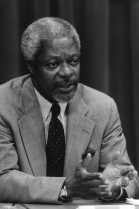|
"I am going to attach a great deal of importance to the economic area. That is why I went to Davos to attend the meeting of the World Economic Forum ... And I look forward to the pooling of efforts between the Bretton Woods institutions and us."
|
U.N. should not diminish its role in social and economic affairs, says Annan
UNITED NATIONS, Feb 13 (IPS)— U.N. Secretary-General Kofi Annan says the United Nations should not diminish its current role in economic and social affairs.
“We should be creative and adapt our role to be able to have greater impact on the ground,” Annan told newsreporters.
Addressing a press conference at the United Nations Headquarters, he said that part of the adaptation will involve pooling U.N.’s efforts with the World Bank, the IMF and other institutions “to have greater impact for the governments we are seeking to serve.”
“I think one of the things that I have said right from the beginning is that I am going to try to get the United Nations and its agencies, including the Bretton Woods institutions, to work more as a system,” he added.
“I have also met with the head of the World Trade Organisation (WTO), and as we look at the reform and our effort to restructure the economic and social area, we are not limiting ourselves only to the Secretariat per se; we are looking at the United Nations, the Funds and the Programmes, and, of course, the linkages with the other agencies,” Annan said.
He also said: “I am going to attach a great deal of importance to the economic area. That is why I went to Davos to attend the meeting of the World Economic Forum... And I look forward to the pooling of efforts between the Bretton Woods institutions and us,” he added.
U.N. spokesman Fred Eckhard says Annan would have to consult with all 185 member-states and will not be rushed into a politically sensitive decision that calls for the elimination or merger of U.N. bodies.
For his part, the Secretary-General would prefer his attitude toward the reform process to be described as ‘’patient’’ and ‘’persistent’’, according to Eckhard, who points out that the Secretary-General has been in office for only ‘’a little over five weeks.’’
‘’That is a bit early to be drawing conclusions about his progress with reform,’’ says Eckhard.
 |
Mr. Kofi Annan, Secretary-General of the United Nations. |
Last month, Annan promised a package of U.N. reforms will be ready by July or August this year. This package, to be put together with the help of all member-states, could not only include cuts in staff, programmes, and U.N. departments, but also the creation of the position of Deputy Secretary-General.
‘’What he was talking about in the plan concerned changes that member-states were also involved in, something that he had to negotiate with those states,’’ Eckhard said.
The Bill Clinton Administration engineered the ouster of former Secretary-General Boutros Boutros-Ghali primarily because he did not introduce U.N. reforms fast enough for Washington’s liking.
The expectation was that Annan would be more receptive to a radical reform of the U.N. system.
But since he took over from Boutros-Ghali Jan. 1, Annan has sought to consult with the Group of 77 before rushing into a merger that affects the interests of mostly Third World nations.
Besides the merger of the three departments, the United States also proposes a new ‘’sunset policy’’ in order to provide accountability and improved performance.
Under this policy, it would be a standard practice throughout the U.N. system for programmes to end after a specified period, unless they have ‘’conclusively demonstrated their continuing relevance and value according to established criteria.’’
But a former Secretary-General of the Geneva-based U.N. Conference on Trade and Development (UNCTAD) smells a rat in the attempts to shrink the United Nations.
‘’They want to dilute the U.N.’s leadership role in development issues on the ground, (arguing) that there are other actors such as the World Bank, the International Monetary Fund and the World Trade Organisation (WTO) to deal with economic, financial, and trade issues,’’ says Gamani Corea of Sri Lanka.
‘’I think this whole idea of reform does not bode well for the United Nations,’’ Corea said. ‘’It may be necessary to keep the big powers and the public in these countries happy. But with that kind of motivation, you are not going to get a very virile United Nations.’’
Asked if social and economic issues were likely to be given over to the World Bank and the IMF, leaving the United Nations to deal only with political and peacekeeping issues, Corea said he saw the beginning of such a trend.
‘’The two Bretton Woods institutions and the WTO form the new triumvirate,’’ he warned. ‘’And most of the economic issues are being taken over by them.’’
|

